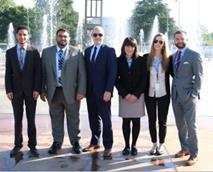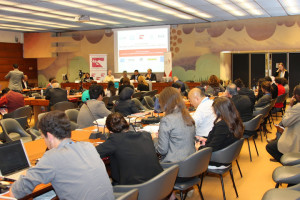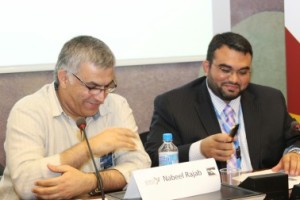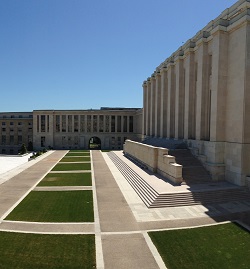In June 2014, Americans for Democracy & Human Rights in Bahrain (ADHRB) engaged the 26th Session of the United Nations Human Rights Council (HRC26) in Geneva, Switzerland to raise awareness of ongoing human rights abuses in Bahrain. ADHRB conducted advocacy meetings with member states, the United Nations Office of the High Commissioner for Human Rights, NGOs, and United Nations officials and Special Procedures, hosted two side events, conducted oral interventions, and provided commentary.
Continue reading or click here for a PDF of this summary.

As HRC26 kicked off, ADHRB met with countries to build support for a Swiss joint statement, which was released on 10 June with 47 signatories. ADHRB praised the joint statement for citing a litany of ongoing human rights abuses ranging from the repression of demonstrations to ongoing reports of torture. It also called on the Government of Bahrain to take concrete steps towards addressing the crisis.
That same day, ADHRB and the Bahrain Institute for Rights and Democracy (BIRD) presented an oral intervention during the general debate under Agenda Item 2 regarding annual reporting of the United Nations High Commissioner for Human Rights, Office of the High Commissioner, and the Secretary-General. ADHRB raised the cases of a number of human rights defenders, including Abdulhadi al-Khawaja, Abduljalil Singace, Mahdi Abu Dheeb and Ibrahim Sherif, among others.
On 11 June, ADHRB co-sponsored an event titled “Bahrain: Empty Promises, Crowded Prisons” with the Bahrain Center for Human Rights (BCHR), the Cairo Institute for Human Rights Studies (CIHRS), CIVICUS, the International Federation for Human Rights (FIDH), and Human Rights Watch (HRW). The speakers included BCHR’s Nabeel Rajab (via Skype) and Maryam Al-Khawaja, Philippe Dam of HRW, and Jeremie Smith of CIHRS. The panel discussed the unfair dichotomy between trials for political prisoners and the culture of impunity for state actors in Bahrain.
The first week of HRC26 concluded with ADHRB Advocacy Associate Michael Payne speaking on a panel supported by the Khiam Center for Rehabilitation and the Bahrain Human Rights Observatory (BHRO). The panel consisted of activists from across the region discussing the human rights abuses in Bahrain. Mr. Payne discussed how human rights advocates can improve their efforts for progress in Bahrain at the Human Rights Council.

On 17 June, ADHRB hosted a side event to release a new report, “Slaving Away: Migrant Labor Exploitation and Human Trafficking in the Gulf”, that addresses migrant labor rights in Bahrain, Qatar, and Saudi Arabia. The event was co-sponsored by BIRD, HRW, Freedom House, and the Solidarity Center. The panel featured ADHRB Executive Director Husain Abdulla as moderator, ADHRB Legal Officer James Suzano, Mahendra Pandey of Pravasi Nepali Coordination Committee, Ali Aldubisy from the European Saudi Society for Human Rights, Nicholas McGeehan of HRW, and Mohamed al-Tajer of BHRO. Panelists discussed the significant human rights concerns associated with the kafala system of sponsorship as well as steps each country could take to address abuses. Panelists agreed that more pressure needed to be applied from the international community to adequately tackle migrant labor abuse and human trafficking in the region.
On 18 June, ADHRB’s Husain Abdulla delivered an oral intervention under Item 9 regarding racism and related forms of intolerance. Mr. Abdulla highlighted discriminatory government practices against the Bahraini Shi’a community, including the targeting of Shi’a religious leaders like Sheikh Husain Najati, Sheikh Mohammed Habib Muqdad, Sheikh Mirza al-Marhoos, Sheikh Abduljalil Muqdad, Sheikh Mohammed Ali al-Mahfood, and Sheikh Abdulhadi al-Mokhodir. Mr. Abdulla called on Bahrain to facilitate a visit by the Special Rapporteur on freedom of religion or belief, and to uphold its 2012 Universal Periodic Review recommendations regarding freedom of religion and ending discriminatory practices against Shi’a.

On 19 June, ADHRB hosted its second side event, supported by BIRD, BHRO, BCHR, CIVICUS, FIDH, Freedom House, Reporters without Borders (RSF), Pen International, Redress, and HRW. Panelists included ADHRB’s Husain Abdulla as moderator, Joe Stork of HRW, Mohammed al-Tajer of BHRO, Julie Gromellon of FIDH, Bahraini journalist Esmat al-Mousawi, and Nabeel Rajab of BCHR. The event, entitled “Concrete Steps: The Need for HRC Action on Human Rights in Bahrain,” examined actions that the Human Rights Council could take to address the human rights crisis in Bahrain and served as Nabeel Rajab’s first international appearance since being completing his 2-year arbitrary prison sentence.
Later that day, BIRD’s Advocacy Associate, Amanda Milani, delivered an oral intervention (1:53:40) to the Council under Agenda Item 3 on the situation of trafficking persons and migrant workers in Bahrain, Qatar and Saudi Arabia. Her statement was the first time that ADHRB or BIRD had given an intervention in French. The statement supported the findings of ADHRB’s report launched the same week.
On 23 June, ADHRB’s Advocacy Associate, Michael Payne, delivered an oral intervention (begins at 1:08:00) to the Council under Agenda Item 4 on the human rights situation in Bahrain and Saudi Arabia. In the statement, ADHRB specifically highlighted the cases of arbitrary detention, torture, and extrajudicial killing of human rights defenders, journalists, and peaceful protesters in the two countries.
On 24 June, Mr. Payne delivered an oral intervention (1:20:05) under Item 8 on the Bahrain government’s follow-up and implementation of the Vienna Declaration and Program of Action. Mr. Payne highlighted the Government of Bahrain policy of arresting and abusing journalists and members of the press in Bahrain to silence dissent, as exemplified by the treatment of Husain Hubail, Abduljalil Singace and Mohammed Hassan. ADHRB called for Bahrain to immediately and unconditionally release all persons held on charges related to their free and peaceful expression or assembly.
On 25 June, ADHRB presented its final oral intervention to the Council, this time under Item 10 regarding to technical assistance and capacity building. In discussing government institutions in Bahrain, Mr. Payne noted that “both the Office of the Ombudsman for the Ministry of Interior and National Institution for Human Rights (NIHR) require further reform and additional capacity assistance, in order to act as effective, independent, credible and transparent checks against further human rights abuses in Bahrain.”





